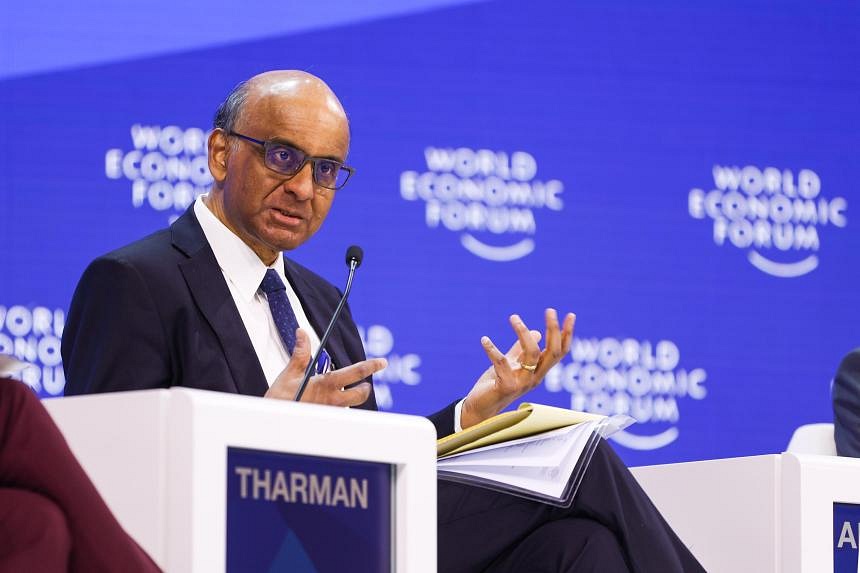SINGAPORE - The world needs to cut high levels of debt and raise tax revenues to deal with challenges such as climate change and rapid ageing in developed countries, said Singapore President Tharman Shanmugaratnam.
Speaking at a World Economic Forum panel discussion in Davos, the President said the world needs to invest in solutions for these long-term challenges, which would require fiscal reforms.
“We spend a lot of time talking about monetary policy; we spend very little time talking about fiscal policy reforms for a more secure future,” he said on Jan 19.
“We’re neglecting fiscal reform because it’s never pleasant to talk about raising revenues or raising taxes. It’s never pleasant to talk about redirecting subsidies or redirecting spending. So, we’re merrily gliding into the future, tinkering at the edges.”
He said the big global issues are how to address the climate transition, the needs of ageing societies and broken social security systems.
Dr Ngozi Okonjo-Iweala, director-general of the World Trade Organisation (WTO), agreed with Mr Tharman’s argument. She said world leaders, especially those from developed countries, will have to agree on issues like a global carbon tax to help fund green projects and affected communities in the developing world.
“We have to look at what we need to do on the fiscal side to finance the green transition. The money isn’t coming. The amounts are huge, trillions are needed,” she said.
Dr Okonjo-Iweala said Africa, for instance, needs US$190 billion (S$255 billion) per year up to 2030 to finance the green transition.
The WTO is already trying to convince international bodies like the International Monetary Fund (IMF), the World Bank and the Organisation for Economic Cooperation and Development to work together – rather than separately – on a global carbon tax mechanism which is agreeable to a majority of nations worldwide.
“Finally we are coming together in one task force to try to see if we can put all our energies together and develop a common methodology or framework,” she said.
Mr Tharman said: “There’s no realistic or fair solution (to the climate transition) that does not involve a globally coordinated system of carbon taxes.”
The President also disagreed with the common perception that a global carbon tax will be unjust or unfair, and will lead to inflation.
“In fact, quite the contrary. If we don’t do this, the countries that will suffer most ultimately, are the developing countries, they’re going to be the worst affected by climate change,” he said.
What is needed are a system of carbon taxes, coupled with subsidies for vulnerable households, and a stream of funding for the developing world to allow these countries to engage in investments in mitigation and adaptation that allow them to keep growing, he said. “And that’s a real opportunity. It’s a fair solution and is the only realistic solution.”
The IMF has estimated that about US$1.3 trillion is spent each year on fuel subsidies worldwide, which is about five times more than the amount of subsidies that go into green technologies and green energy.
Mr Tharman said those fuel subsidies need to be redirected to help vulnerable households and businesses adjust to renewables and other green technologies.
Dealing with the challenge of ageing societies, the President said, will also need the rejigging of social security systems and healthcare financing systems in significant ways.
“Too many people who don’t need support are getting disproportionate support in many countries. And too many people who need support the most in healthcare systems are not getting enough support. So there has to be a reshaping of subsidies within healthcare, to benefit those who need it the most,” he said.
Mr Tharman said there has to be more spending on preventive or pre-emptive healthcare to help people stay healthy for as long as they can, rather than wait for the very expensive occasions when they end up in hospital, particularly for acute care.
“Social security can also be reformed to reduce spending, by reforming labour markets to allow people to stay engaged at work if they wish for as long as possible.”
Rounding up the discussion, Mr Tharman urged countries to start moving to avoid piling up problems for the future. He said: “Our political antennae have gotten too short. We are looking at the next elections in a whole range of countries. And the consequences if we carry on that way are going to be much more pain in future, and a much higher hurdle that future politicians will need to cross.”


